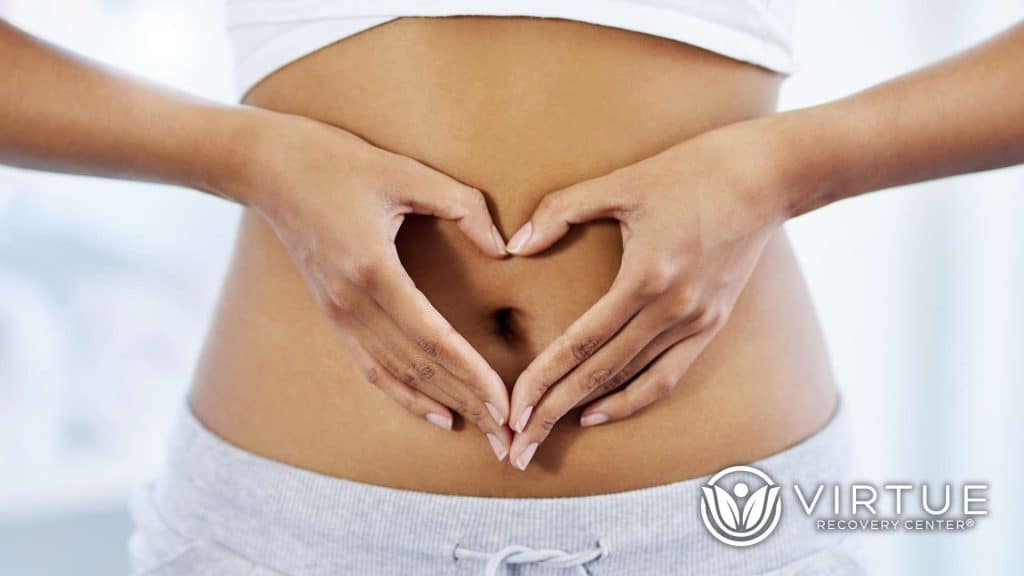Key Takeaways
- The gut microbiome and brain are closely connected, influencing addiction and mental health.
- Gut bacteria impact brain function by producing neurotransmitters like serotonin and dopamine.
- Substance use can disrupt the gut microbiome, leading to gut inflammation and increased cravings.
- Healing the gut may improve addiction recovery, reducing withdrawal symptoms and stress responses.
- Virtue Recovery Houston offers addiction treatment programs that consider gut health in recovery.
Introduction
Addiction affects both the brain and body, but a lesser-known factor in substance use disorders is the gut microbiome. The gut is home to trillions of bacteria that play a major role in digestion, immune function, and even mental health. Scientists now recognize that gut health and brain function are deeply connected, influencing mood, cravings, and addictive behaviors. The gut-brain axis is a two-way communication system that links the digestive system to the brain. When the gut microbiome is balanced, it supports healthy brain function and emotional stability. However, substance abuse can disrupt gut bacteria, leading to inflammation, mental distress, and stronger cravings. This article explores the relationship between the gut microbiome and addiction, the effects of substance abuse on gut health, and how improving gut function can aid recovery.Understanding the Gut-Brain Connection
The gut microbiome consists of trillions of bacteria, viruses, and fungi that help regulate digestion, metabolism, and the immune system. More importantly, these gut microbes influence the brain by producing neurotransmitters like serotonin, dopamine, and GABA, which are essential for mood regulation and decision-making. The gut-brain axis allows signals to travel between the gut and brain through the vagus nerve, hormones, and immune system responses. When the gut is healthy, this communication works smoothly. However, substance use can disrupt gut bacteria, leading to imbalances that affect brain function. A well-balanced gut microbiome helps regulate:- Stress and anxiety by influencing cortisol and serotonin levels.
- Cravings and impulse control by affecting dopamine production.
- Mood and emotional stability by supporting neurotransmitter function.
How Substance Abuse Affects the Gut Microbiome
Drugs and alcohol do more than alter brain chemistry—they also harm the gut. Chronic substance use can change gut microbiota composition, leading to inflammation, digestive issues, and a weakened gut barrier.Alcohol and Gut Health
Excessive alcohol use damages the gut by:- Killing beneficial gut bacteria, leading to an imbalance of harmful microbes.
- Increasing gut permeability, also known as leaky gut, which allows toxins to enter the bloodstream.
- Triggering inflammation, which contributes to anxiety, depression, and cognitive decline.
Opioids, Stimulants, and Gut Dysbiosis
Other substances, including opioids and stimulants like cocaine and methamphetamine, also disrupt gut microbiota balance. Opioids slow digestion and cause constipation, while stimulants alter gut motility and increase stress hormones. Over time, drug-induced gut dysbiosis may contribute to:- Weakened immune function, making individuals more prone to infections.
- Digestive discomfort, leading to nausea, bloating, and irregular bowel movements.
- Increased cravings, as gut microbes influence dopamine and serotonin production.
The Role of Gut Health in Addiction Recovery
Healing the gut microbiome is an important step in addiction recovery. When gut bacteria are restored to a healthy balance, individuals may experience fewer withdrawal symptoms, improved mood, and reduced cravings.Restoring Gut Balance Through Diet
A diet rich in fiber, fermented foods, and essential nutrients supports gut health. Foods that promote a healthy gut microbiome include:- Probiotic-rich foods like yogurt, kefir, and sauerkraut.
- Prebiotic fibers found in garlic, onions, bananas, and whole grains.
- Anti-inflammatory foods such as leafy greens, fatty fish, and nuts.
The Impact of Probiotics and Supplements
Probiotics, or beneficial bacteria, can help restore gut health after substance use. Some probiotic strains, such as Lactobacillus and Bifidobacterium, have been shown to reduce stress, anxiety, and inflammation. Other helpful supplements include:- Omega-3 fatty acids, which reduce inflammation and support brain function.
- Glutamine, an amino acid that helps heal the gut lining.
- Magnesium, which promotes relaxation and reduces stress-related cravings.
Exercise and Stress Reduction
Physical activity improves both gut and brain health by reducing inflammation, lowering stress, and promoting the growth of healthy gut bacteria. Meditation, deep breathing, and yoga can also help regulate the gut-brain connection and support emotional balance during recovery. By focusing on gut health as part of addiction treatment, individuals can improve their mental and physical well-being, making long-term recovery more sustainable.Virtue Recovery Houston: A Holistic Approach to Addiction Treatment
At Virtue Recovery Houston, we understand that addiction affects the entire body, including the gut and brain. Our treatment programs take a comprehensive, whole-body approach to healing, ensuring that individuals receive care that addresses both physical and emotional recovery. Our services include:- Medical detox and withdrawal management with professional support.
- Nutritional counseling to restore gut health and improve well-being.
- Cognitive Behavioral Therapy (CBT) and holistic therapies for emotional and mental health.
- Long-term support and aftercare to prevent relapse and promote lasting recovery.
How Can Community Centers Support Individuals in Recovery from Addiction Related to Gut Microbiome and Brain Health?
Community centers can play a crucial role in recovery by providing essential community support networks. These centers facilitate workshops that educate individuals about the gut microbiome and its impact on brain health, helping them understand the connections between diet, mental well-being, and recovery, fostering a sense of belonging and shared healing.








